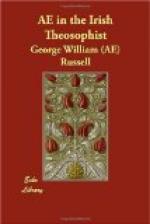For the hero with us there is ample scope and need. There are the spectres of ignoble hopes, the lethal influences of a huge material civilisation wafted to us from over seas, which must be laid. Oh, that a protest might be made ere it becomes more difficult, ere this wild, beautiful land of ours be viewed only as a lure to draw money from the cockney tourist, and the immemorial traditions around our sacred hills be of value only to advertise the last hotel. Yet to avert the perils arising from external causes is but a slight task compared with the overcoming of obstacles already existent within. There is one which must be removed at whatever cost, though the hero may well become the martyr in the attempt. It is a difficulty which has its strength from one of the very virtues of the people, their reverence for religion. This in itself is altogether well. But it is not well when the nature of that religion enables its priests to sway men from their natural choice of hero and cause by the threat of spiritual terrors. I say that where this takes place to any great extent, as it has with us, it is not a land a freeman can think of with pride. It is not a place where the lover of freedom can rest, but he must spend sleepless nights, must brood, must scheme, must wait to strike a blow. To the thought of freedom it must be said to our shame none of the nobler meaning attaches here. Freedom to speak what hopes and ideals we may have; to act openly for what cause we will; to allow that freedom to others—that liberty is denied. There are but too many places where to differ openly from the priest in politics is to provoke a brawl, where to speak as here with the fearlessness of print would be to endanger life. With what scorn one hears the aspiration from public freedom from lips that are closed with the dread by their own hearthside! Let freedom arise where first it is possible in the hearts of men, in their




